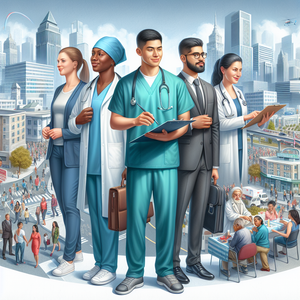Exploring the Hidden World of Part-Time Non-Clinical Physician Jobs

The allure of non-clinical positions for physicians is multi-faceted. Many practitioners face burnout due to the demanding nature of clinical work, which can lead to a search for alternative career paths that offer both fulfillment and flexibility. Non-clinical roles enable physicians to maintain a connection to the healthcare field while enjoying a more balanced lifestyle.
Types of Non-Clinical Roles
There are various types of non-clinical roles available for physicians, including consulting, medical writing, healthcare technology, public health and policy, and education and training.
Consulting
Consulting is one of the most sought-after non-clinical roles for physicians. By leveraging their clinical experience and knowledge, physicians can provide valuable insights to healthcare organizations.
Medical Writing
The demand for clear and accurate medical writing has surged in recent years, creating ample opportunities for physicians with a knack for communication.
Healthcare Technology
The intersection of medicine and technology is an exciting and rapidly evolving field. Physicians can find rewarding roles in health tech startups.
Public Health and Policy
For those interested in shaping healthcare from a broader perspective, roles in public health and policy can be incredibly rewarding.
Education and Training
Another avenue for physicians to explore is education and training. They can pivot to roles that involve teaching medical students or providing training for healthcare professionals.
Navigating the Transition
Transitioning from clinical practice to a non-clinical role can be daunting, but it is entirely feasible with the right approach.
The hidden world of part-time non-clinical physician jobs is rich with opportunities for those willing to explore beyond traditional patient care. These roles address the urgent need for work-life balance and reduced burnout while allowing physicians to remain engaged in the healthcare field in a meaningful way.
Healthcare Consultant
Consulting firms like McKinsey & Company or Deloitte, hospitals and healthcare organizations
Core Responsibilities
Analyze healthcare systems and processes to identify areas for improvement and efficiency.
Provide strategic recommendations to healthcare organizations on best practices and compliance.
Collaborate with clinical and administrative teams to implement solutions.
Required Skills
Strong analytical and problem-solving skills, along with a deep understanding of healthcare regulations.
Excellent communication and interpersonal skills for client interactions.
Experience in clinical practice or healthcare management is highly valued.
Medical Writer
Medical communication agencies, pharmaceutical companies, and healthcare organizations
Core Responsibilities
Create clear and engaging content for medical journals, patient education materials, and pharmaceutical marketing.
Research complex medical topics to ensure accuracy and relevance in writing.
Work closely with healthcare professionals to gather insights and develop comprehensive materials.
Required Skills
Strong writing and editing skills, with the ability to translate complex medical information into accessible language.
Familiarity with regulatory guidelines in medical writing (e.g., FDA regulations).
A background in medicine or a related field is essential for credibility.
Health IT Specialist
Health tech startups, hospitals, and IT consulting firms specializing in healthcare
Core Responsibilities
Implement and manage electronic health record (EHR) systems and other healthcare technologies.
Collaborate with clinical staff to understand their needs and improve technology usability.
Train healthcare professionals on new technologies and ensure compliance with data privacy regulations.
Required Skills
Strong technical skills in IT systems and healthcare software.
Understanding of clinical workflows and patient care processes.
Previous experience in a clinical setting can greatly enhance effectiveness in this role.
Public Health Policy Analyst
Government health departments, non-profit organizations, and think tanks focused on health policy
Core Responsibilities
Research and analyze health policy issues, providing recommendations for public health initiatives.
Collaborate with government agencies and community organizations to develop strategies addressing health disparities.
Monitor legislation and regulatory changes impacting public health.
Required Skills
Strong research and analytical skills, with an emphasis on data interpretation.
Excellent written and verbal communication skills for presenting findings and recommendations.
Familiarity with public health principles and policies is critical.
Medical Educator
Medical schools, teaching hospitals, and healthcare training institutions
Core Responsibilities
Develop and deliver educational programs for medical students, residents, or healthcare professionals.
Mentor and guide trainees in clinical settings or academic environments.
Evaluate and assess educational outcomes to improve training programs.
Required Skills
Strong teaching and curriculum development skills, with the ability to engage and inspire learners.
In-depth knowledge of clinical medicine and educational methodologies.
Previous teaching experience or educational qualifications (such as a Master’s in Education) is preferred.


